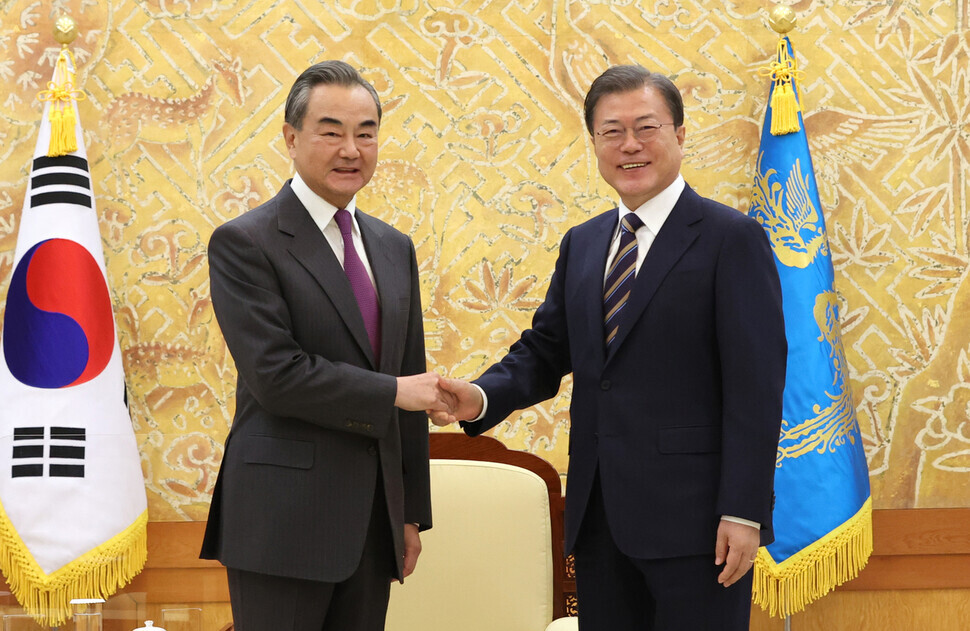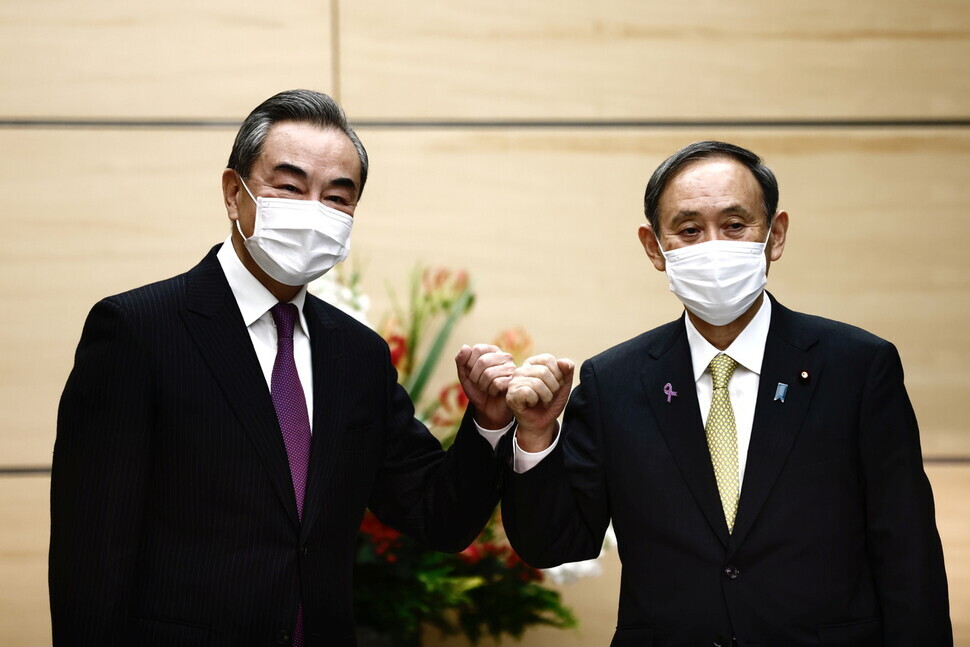hankyoreh
Links to other country sites 다른 나라 사이트 링크
[News analysis] China’s differing approaches to S. Korea and Japan

On Nov. 27, Chinese Foreign Minister Wang Yi wrapped up a three-day trip to South Korea, organized in the weeks before Joe Biden’s inauguration as the next president of the US in January 2020. Wang’s visit is significant since it reveals the differences in China’s strategic attitude toward South Korea and Japan, two of the US’ key allies.
Perhaps the most striking part of Wang’s three-day trip, from Nov. 25-27, was his meeting over breakfast with a group of figures including Moon Chung-in, South Korea’s special presidential advisor for unification, foreign affairs and national security, on Nov. 27.
A document from China’s Ministry of Foreign Affairs summarizing the breakfast meeting includes a number of significant phrases. The document quoted Wang as making the following comments about China-South Korea relations during the meeting: “The leaders of our two countries want to bring about a blueprint for bilateral relations that lines up with our fundamental interests according to their shared attitudes on important issues and to incorporate [that blueprint] into a developmental strategy so as to steadily pursue bilateral relations through working-level-cooperation.”
The Chinese Foreign Ministry’s document said that when Moon Chung-in remarked that South Korea would be put in an awkward position if US-China relations worsen, Wang provided a detailed explanation of China’s position. “We are opposed to a new cold war. That doesn’t match with historical development trends,” Wang was quoted as saying.

Where the Trump administration pooh-poohed US alliances under the banner of “America First,” the Biden administration is expected to retool a trilateral alliance with South Korea and Japan with which it hopes to crank up pressure on China. At such a sensitive time, Wang spoke to South Korea about “shared attitudes” and proposed a blueprint that would encapsulate a joint vision with China. With this proposal, Wang was effectively urging South Korea not to lean too close to the US and to stand with China as defenders of “fairness and justice in the international order.”
In his opening remarks to a meeting with South Korean Foreign Minister Kang Kyung-wha on Nov. 26, Wang hinted at China’s desire to “guard peace and stability in the region” with South Korea while emphasizing a spirit of “shou wang xiang zhu,” a Chinese expression that means “keeping watch over each other and providing mutual assistance” against shared enemies and difficulties. The phrase can be interpreted as a reference to the two countries’ “strategic cooperative partnership.”
In an announcement on Sunday of 10 points agreed to during the foreign ministers’ meeting, China’s Ministry of Foreign Affairs mentioned the “initiation of ‘two plus two’ dialogue between China and South Korea on foreign policy and security.” That item, which didn’t appear in South Korea’s corresponding announcement, seemed to underline the strategic aspect of the two countries’ partnership.
That contrasts with the chilly atmosphere that marked the conclusion of Wang’s visit to Japan on Nov. 24-25. Wang spoke of Japan as being “yi yi dai shui,” literally meaning “separated by a stream,” but referring to close neighbors who are obliged to cooperate with each other. In his meeting with Japanese Foreign Minister Toshimitsu Motegi, Wang only described China and Japan as being “partners for long-term cooperation” and emphasized the need for “appropriate strategic communication.”
The chill in the air was exacerbated by some mutual needling over the Senkaku Islands, known in China as the Dioayu Islands. When Motegi raised concerns about Chinese movements around the Senkaku Islands in a press conference on Nov. 24, Wang countered by pointing out that “Japanese fishing vessels are entering the sensitive waters around the Dioayu Islands.”
China’s divergent attitudes toward South Korea and China were also apparent in connection with the prospect of a state visit by Chinese President Xi Jinping. While Wang conveyed Xi’s verbal message that he “intends to visit when the circumstances permit” to South Korea, Japanese newspaper the Asahi Shimbun reported that Wang made no such comment in Japan.
By Gil Yun-hyung, staff reporter
Please direct comments or questions to [english@hani.co.kr]

Editorial・opinion
![[Column] Park Geun-hye déjà vu in Yoon Suk-yeol [Column] Park Geun-hye déjà vu in Yoon Suk-yeol](https://flexible.img.hani.co.kr/flexible/normal/500/300/imgdb/original/2024/0424/651713945113788.jpg) [Column] Park Geun-hye déjà vu in Yoon Suk-yeol
[Column] Park Geun-hye déjà vu in Yoon Suk-yeol![[Editorial] New weight of N. Korea’s nuclear threats makes dialogue all the more urgent [Editorial] New weight of N. Korea’s nuclear threats makes dialogue all the more urgent](https://flexible.img.hani.co.kr/flexible/normal/500/300/imgdb/original/2024/0424/7317139454662664.jpg) [Editorial] New weight of N. Korea’s nuclear threats makes dialogue all the more urgent
[Editorial] New weight of N. Korea’s nuclear threats makes dialogue all the more urgent- [Guest essay] The real reason Korea’s new right wants to dub Rhee a founding father
- [Column] ‘Choson’: Is it time we start referring to N. Korea in its own terms?
- [Editorial] Japan’s rewriting of history with Korea has gone too far
- [Column] The president’s questionable capacity for dialogue
- [Column] Are chaebol firms just pizza pies for families to divvy up as they please?
- [Column] Has Korea, too, crossed the Rubicon on China?
- [Correspondent’s column] In Japan’s alliance with US, echoes of its past alliances with UK
- [Editorial] Does Yoon think the Korean public is wrong?
Most viewed articles
- 1‘We must say no’: Seoul defense chief on Korean, USFK involvement in hypothetical Taiwan crisis
- 2N. Korean delegation’s trip to Iran shows how Pyongyang is leveraging ties with Moscow
- 3‘Weddingflation’ breaks the bank for Korean couples-to-be
- 4Korea sees more deaths than births for 52nd consecutive month in February
- 546% of cases of violence against women in Korea perpetrated by intimate partner, study finds
- 6Will NewJeans end up collateral damage in internal feud at K-pop juggernaut Hybe?
- 7[Column] Park Geun-hye déjà vu in Yoon Suk-yeol
- 8[Editorial] New weight of N. Korea’s nuclear threats makes dialogue all the more urgent
- 9Amnesty notes ‘erosion’ of freedom of expression in Korea in annual human rights report
- 10“Parental care contracts” increasingly common in South Korea